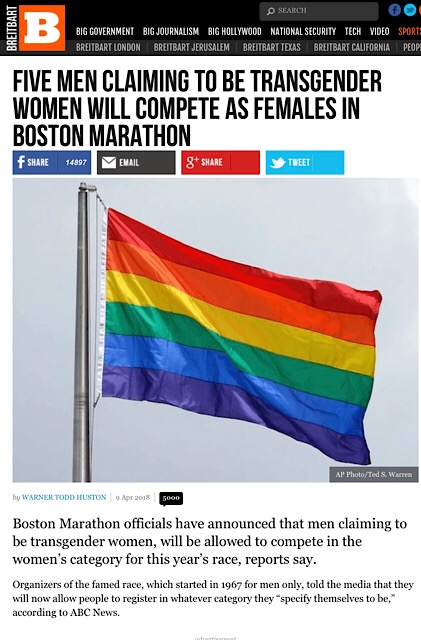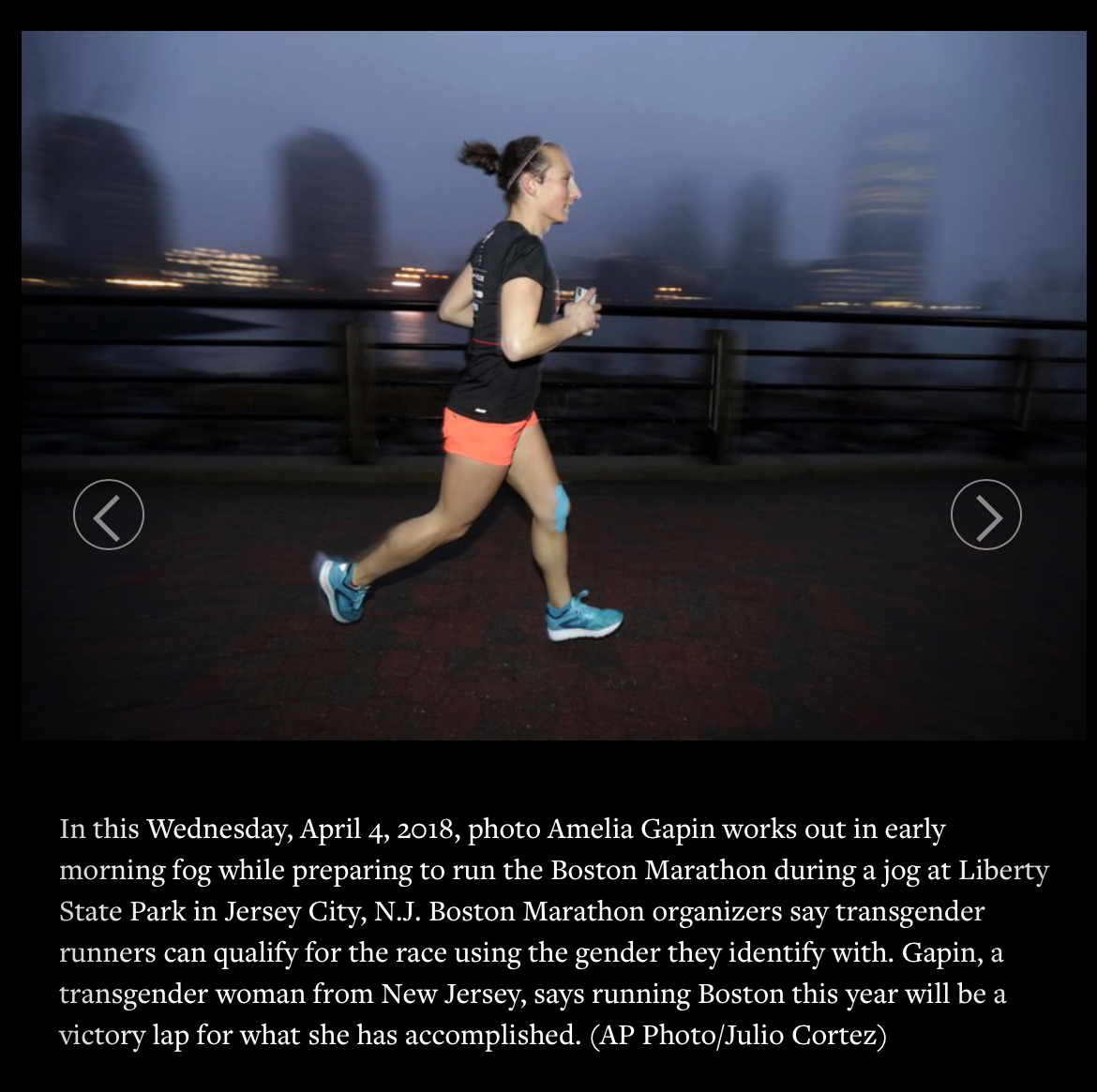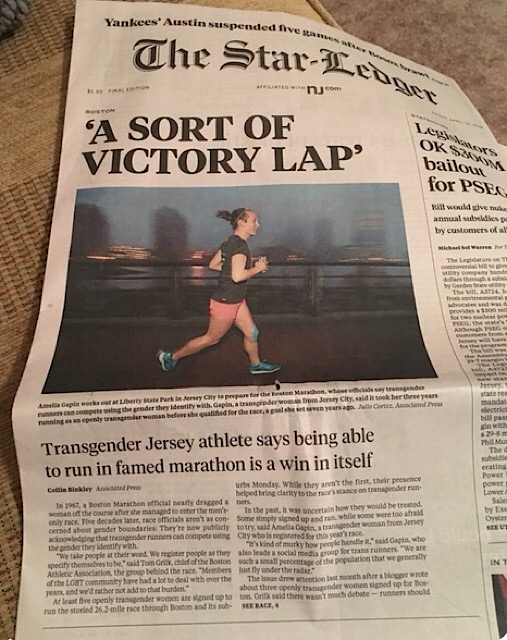I’m sure you’ve all seen the barrage of news articles about transgender runners who will be running Boston Marathon this year. It’s been nothing less than a flood.
And I hate it.
Look, I’m obviously no stranger to media attention and I’m sort of used to this kind of thing. It happens every once in a while—not just with running, but I experienced it with the startup I confounded a few years ago as well. So, whatever on that front, right?
The thing is, though, this is all much ado over nothing, as far as I see it. This really isn’t anything new, trans people have been running marathons forever. And trans people have been running the Boston Marathon for years, as well. The only reason this has even become news is because some asshat decided he needed to write a story about it and erroneously declare it the first time openly transgender women have run the Boston Marathon. Eye-fucking-roll.
Not only is this verifiably false as all hell, it’s not something that could be verified to be true. How could anyone know this? Trans people usually don’t make a big deal out of doing things. For the most part, we just live our lives as best as society allows us to. We do us. If you see something declared as a “first” for transgender people, be very dubious.
However, we keep living this hell of false firsts over and over because cisgender people continue to get off on a voyeurism of trans lives. They treat it like a spectator sport. Something that happens all the time isn’t very interesting, but a first makes for a story.
This is exacerbated by the fact that the world we live in has only recently become one in which trans people have felt safe enough to live their lives in the open. Trans people have been around for as long as humans have, but we’ve been forced to stay under the radar as much as possible. Live quietly and often avoid public life.
There is the argument, of course, that increased visibility and media attention like this is a good thing for trans people. It’s a way for us to gain acceptance and for people to understand our lives better. It can also inspire those who are still in the closet or trying to figure out who they are. Seeing trans people out there living their lives, doing things, and being successful can make them feel less alone. It can show them what’s possible.
This is all very true, for sure. And this was what I hoped for when I decided to accept the opportunity to be on the cover of Women’s Running. Thankfully, much of this has panned out. I’ve had hundreds of trans people reach out to me in the last few years and tell me how much it’s meant to see what I’ve done, said, and written. It’s made them feel less alone.
However, these positives don’t exist in a vacuum. For every one of these articles, there are thousands of comments online from people debating our very existence and humanity. I’ve had tens of thousands of people debate my validity as athlete over the last couple of weeks. For each positive story, there’s a negative story in a conservative news outlet. Or there’s a Tucker Carlson segment on Fox News. Or goddamn Breitbart. Or fucking conservative shitbag Ben Shapiro going off.

My real question is if this was before or after the segment about sex-crazed pandas on the same episode.
I might be good at not reading the comments, but those still living in the closet see this as the world they will be transitioning into. They see the ugliness of how people feel about trans people, still in 2018. Imagine how discouraging this is. Imagine seeing someone like you being successful and thriving, but still having to deal with an avalanche of bullshit. When you’re looking on at all of this, it’s easy to see it as too much to handle. To see yourself as not strong enough to deal with it. I used to feel that way myself. It can be a lot.
And then, of course, there’s Alexis Diao from NPR who threw integrity and responsibility out the window. She didn’t share anything that wasn’t already public, however, she did do so without my consent. She emailed me on a Sunday and gave me 90 minutes to reply before writing about my genitals in her article. I expect this kind of thing from a lot of outlets, but it’s lazy and irresponsible for a journalist from NPR to write an article with only secondhand sources and not allow appropriate time for comment. She also threw me to the wolves by including my Instagram in her story. Now, of course, I’m pretty public with a lot of things. If she had spoken with me, I would have likely consented to these things and shared them. However, I would have done so with context, regarding my surgery. And this would have been my decision. This was not a choice for her to make for me. I am not a public figure. I am a private citizen.
So @NPR decided to write an article and talk about my genitals without giving me a reasonable amount of time time consent or reply. This is irresponsible and disrespectful reporting. Would you like it if someone wrote about your genitals, Alexis Diao? https://t.co/go4tfLvdlq pic.twitter.com/sE0ezdFF4q
— Queen Pisser of X (@EntirelyAmelia) April 8, 2018
They replied to my email pic.twitter.com/Zzc8sAbV7T
— Queen Pisser of X (@EntirelyAmelia) April 8, 2018
Notice how she feels entitled to my time and response for this story? This is how you know she was more interested in writing a voyeuristic piece about trans people rather than treating trans people as human beings with private lives.
— Queen Pisser of X (@EntirelyAmelia) April 8, 2018
Are you reading these comments, @meowdiao? Thanks for throwing me into this. pic.twitter.com/SdBK0EdISd
— Queen Pisser of X (@EntirelyAmelia) April 8, 2018
There are over 1,000 comments on this article debating my humanity and validity as an athlete. And the reporter couldn't be bothered to ask for consent before writing about what's between my legs or sharing my Instagram account. Irresponsible and disrespectful of all trans people pic.twitter.com/WoA1eorVME
— Queen Pisser of X (@EntirelyAmelia) April 9, 2018
Because @meowdiao decided to include my Instagram in her NPR article without consulting me, there is now a Breitbart article about it. They source Time who sources NPR. pic.twitter.com/sWP4OWTd9p
— Queen Pisser of X (@EntirelyAmelia) April 9, 2018
My Instagram has been removed from the NPR article now, but the damage is done and @meowdiao has yet to provide a real apology or offer to take her story down.
— Queen Pisser of X (@EntirelyAmelia) April 9, 2018
If she had actually spoken to me before putting her article up, I'd have volunteered the same information, but that would have been *my* decision to make. She had no right to decide this on her own.
— Queen Pisser of X (@EntirelyAmelia) April 9, 2018
What Alexis did was nothing outside outside voyeurism. What upsets me the most about it is the message it sends to trans people still in the closet. It provides a perfect example how even a reputable and “left” news source like NPR will treat us, not as humans, but as lab animals in a cage to be observed. They will ignore our privacy and safety for the sake of topical byline and some clicks.
Lastly, I’d like to touch just a bit on BAA’s policy for trans runners.
This policy isn’t new this year. It was set a couple years ago after IOC (International Olympic Committee) and USATF (USA Track and Field, the governing body in the US for road races) updated their policies. And, as a side note, those policies were updated because the science and research indicated they should be. There is no evidence of an advantage held by transgender women. The policies weren’t updated because of our feelings. I think most of us, or at least I, actively don’t want an advantage or special treatment and wouldn’t fight for these policies if they did put us at advantage. Very simply, if we had an advantage, you’d see us dominating in the sports we compete in and we’re not. We’re here competing, but we’re not really winning.
So BAA’s recent statement is less a declaration of policy change and more so a statement of an inclusion. That itself is absolutely a positive. It tells trans runners they are seen and welcome. It means we don’t have to try to fly under the radar anymore. We can run openly just like anyone else would.
The policy is a step in the right direction, especially for where we are as a society in 2018, but it still leaves a bit to be desired. Currently, Boston Marathon will accept trans runners as who they say they are as long as their ID matches how they register. And when you register, your qualification race must also match.
The ability to update one’s ID is a privilege in itself. Name changes cost money. And the laws regarding gender marker changes vary from state to state. In some states, it’s easy. In some states, not so much. Many states require trans people to have bottom surgery before allowing them to update their gender marker. With the Boston Marathon still requiring ID that matches registration, this effectively means, for many runners, bottom surgery is still be required.
Additionally, your qualifying time must be done at a race in which your name and gender match how you are registering for Boston. In some ways, this is the easier part. For most races, it’s much easier to just register under your real name and gender without having matching ID. World Marathon Major races check ID when you pick up your race bib, but other marathons don’t necessarily do so. Flying under the radar here is much easier. However, because some races do check, and this is something a runner will need to know ahead of time, the Boston qualifying race options can be more limited for a transgender runner. For example, a runner hoping to qualify at Chicago, one of the World Marathon Majors and one of the fastest qualifying courses, would need to have ID that matches their registration name and gender. Given the way the calendar works, effectively, this runner would have to have their ID sorted out a year and a half before the Boston Marathon they are hoping to run.
And to be clear, we’re not talking about length of time on hormones or anything like that. We’re strictly talking about documentation. The way all of these things work out, it’s essentially impossible to get to the starting line at Boston without at least a year on hormones. And it would be difficult to even qualify under your real name and gender without a year or more on hormones.
The announcement from BAA and their policy are a step forward and, again, for where we’re at in 2018 as a society, not completely awful. But it’s not enough. It still excludes and adds burden for many transgender runners. Unfortunately, further steps forward are unlikely to happen without much larger conversations about how we segregate athletes and how qualification times can be enforced without matching ID. I don’t have easy answers here and I don’t see this conversation happening any time soon. When it comes to this segregation, it’s not just about transgender athletes. There are cisgender athletes (e.g. Caster Semenya) who fall outside of what would be considered the norm.
Overall, all of this is a mixed bag. There are positives, but they don’t come with out negatives.
It’s easy for friends and family to see my attention as exciting and all of that, but a lot of the time, it’s just added stress and burden. Especially, when you’re trying to get in the headspace for a marathon. My last two weeks have been incredibly busy trying to fit in all of these interviews and such. I even had to meet up with a few photographers.
I can, of course, turn it all down. Sometimes I do. But, generally, these stories are still going to happen whether you talk to them or not. And if it’s going to happen, I’d rather try to at least guide them in the right direction and get the correct facts into their hands. I can’t guarantee what they do when this information, but I’ve seen over and over that the end result is better if they do talk to an actual transgender person. That person, obviously, doesn’t have to be me. I don’t care about fame or attention. However, I am already the one in this position. I gladly share it with others who want it or are willing, but I accept the role I’ve come to be in and what comes with that. If this means I serve as a 💩☂ for other trans runners who just want to be more quiet about their lives, I’m okay with that.
Finally, yesterday when I went to the expo to pick up my bib, the guy checking my ID inspected the everliving hell out of it. None of the three times I’ve run Chicago did anyone ever do more than a quick check to make sure the name matched. This guy was all up in there, though. Now, I don’t know if this is normal at Boston or maybe just the way this guy is, however, coupled with how unfriendly he was, I think it’s reasonable to wonder. He’s no doubt heard about the trans runners this year and it’s not far-fetched to think that maybe he realized I was trans and decided to be extra thorough with checking my ID. There is really no way to know, but this is a possibility. It could also be nothing. But it is something to be cognizant of as a trans person.
Anyway, I plan to have a fucking blast this weekend. Neither this nor the weather will dampen my experience, but I think maybe people could just be a lot more compassionate.


